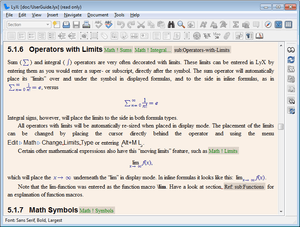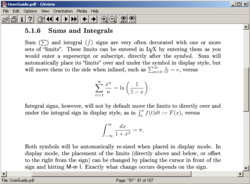LyX
LyX (styled as ; pronounced [ˈlɪks]) is an open source document processor based on the LaTeX typesetting system. Unlike most word processors, which follow the WYSIWYG ("what you see is what you get") paradigm, LyX has a WYSIWYM ("what you see is what you mean") approach, where what shows up on the screen roughly depicts the semantic structure of the page and is only an approximation of it.
 | |
 Screenshot of LyX 2.1.x on Windows | |
| Developer(s) | The LyX Team |
|---|---|
| Initial release | 1995 |
| Stable release | 2.3.5.2
/ 30 June 2020 |
| Repository | |
| Written in | C++, Qt 5[1] |
| Operating system | Cross-platform |
| Available in | Multilingual (23) |
| Type | Document processor |
| License | GNU General Public License |
| Website | www |
Since LyX relies on the typesetting system of LaTeX without being a full-fledged LaTeX editor itself, it has the power and flexibility of LaTeX, and can handle documents including books, notes, theses, to academic papers, letters, etc. LyX's interface is structured so that while knowledge of the LaTeX markup language is not necessary for basic usage, new LaTeX directives can be added into the document to support more complex features during editing — though not at the level of full control a full-fledged LaTeX editor can afford.[2][3][4][5]
LyX is popular among technical authors and scientists for its advanced mathematical modes, though it is increasingly used by non-mathematically-oriented scholars as well[6][7] for its bibliographic database integration[8] and its ability to manage multiple files.[8] LyX has also become a popular publishing tool among self-publishers.[9][10]
LyX is available for various operating systems, including Windows, MacOS, Linux, UNIX, OS/2 and Haiku. LyX can be redistributed and modified under the terms of the GNU General Public License and is thus free software.
Features
- GUI with menus
- Automatically numbered headings, titles, and paragraphs, with table of contents
- Text is laid out according to standard typographic rules, including ligatures, kerning, indents, spacing, and hyphenation
- Support for right-to-left languages like Arabic,[11] Persian,[12] and Hebrew,[13] along with support for bi-directional text
- Support for Chinese, Japanese, and Korean languages
- Support for the XeTeX and LuaTeX typesetting systems
- Standard operations like cut/paste, spell-checking
- Notes
- Textclasses and templates similar to the \documentclass[arguments]{theclass} command in LaTeX
- BibTeX/BibLaTeX Support
- Table Editor (WYSIWYG)
- Math Editor (WYSIWYG)
- Ability to import various common text formats
 Screenshot of PDF document created with LyX
Screenshot of PDF document created with LyX - Ability to natively export the document to DocBook SGML, XHTML and plain text
- SVN, Git, RCS, CVS-support for collaboration
- Others – see detailed list
History
Matthias Ettrich started developing a shareware program called Lyrix in 1995. It was then announced on Usenet, where it received a great deal of attention in the following years.
Shortly after the initial release, Lyrix was renamed to LyX due to a name clash with a word processor produced by the company Santa Cruz Operation.[14] The name LyX was chosen because of the file-suffix '.lyx' for Lyrix files.[15]
Versions
| Version | Release date |
|---|---|
| 0.7.0 | October 24, 1995 |
| 1.0.0 | February 1, 1999 |
| 1.2.0 | May 29, 2002 |
| 1.3.0 | February 7, 2003 |
| 1.4.0 | March 8, 2006 |
| 1.5.0 | July 27, 2007 |
| 1.6.0 | November 10, 2008 |
| 2.0.0 | May 8, 2011.[16] |
| 2.1.0 | April 25, 2014.[17] |
| 2.2.0 | May 26, 2016 |
| 2.3.0 | March 16, 2018 |
Pronunciation
According to the project's wiki, the developers pronounce LyX as [ˈlɪks], like the English word "licks", or [ˈlʏks].[18]
See also
- List of word processors
- Comparison of word processors
- Comparison of TeX editors
- Scientific WorkPlace – A proprietary software (non-free) counterpart of LyX
References
- http://wiki.lyx.org/LyX/NewInLyX22
- "LyX | Features". www.lyx.org. Retrieved 2019-07-15.
- "Is LyX an editor which should be recommended?". TeX - LaTeX Meta Stack Exchange. Retrieved 2019-07-15.
- "editors - What are the benefits and drawbacks of Lyx compared to TeXnicCenter". TeX - LaTeX Stack Exchange. Retrieved 2019-07-15.
- "The Definitive, Non-Technical Introduction to LaTeX, Professional Typesetting and Scientific Publishing". Math Vault. 2015-09-05. Retrieved 2019-07-15.
- "Lyx for Linguistics".
- "Lyx for Humanities".
- "Lyx features".
- "LyX and Lulu".
- "LyX produced publications".
- "Arabic support for LyX".
- "Farsi support for LyX".
- "Hebrew support for LyX".
- "WANTED: Name for Wordprocessor (comp.os.linux.development.apps)". Retrieved 2010-10-15.
- LyX Archaeology
- "ANNOUNCE: LyX version 2.0.0 is released". Retrieved 2011-05-08.
- "LyX 2.1.0 released". Retrieved 2014-04-26.
- FAQ/Pronunciation, LyX Wiki. Retrieved 4 April 2008.
External links
- Official website
- LyX Wiki
- A comparative review of Scientific WorkPlace and LyX in Journal of Statistical Software